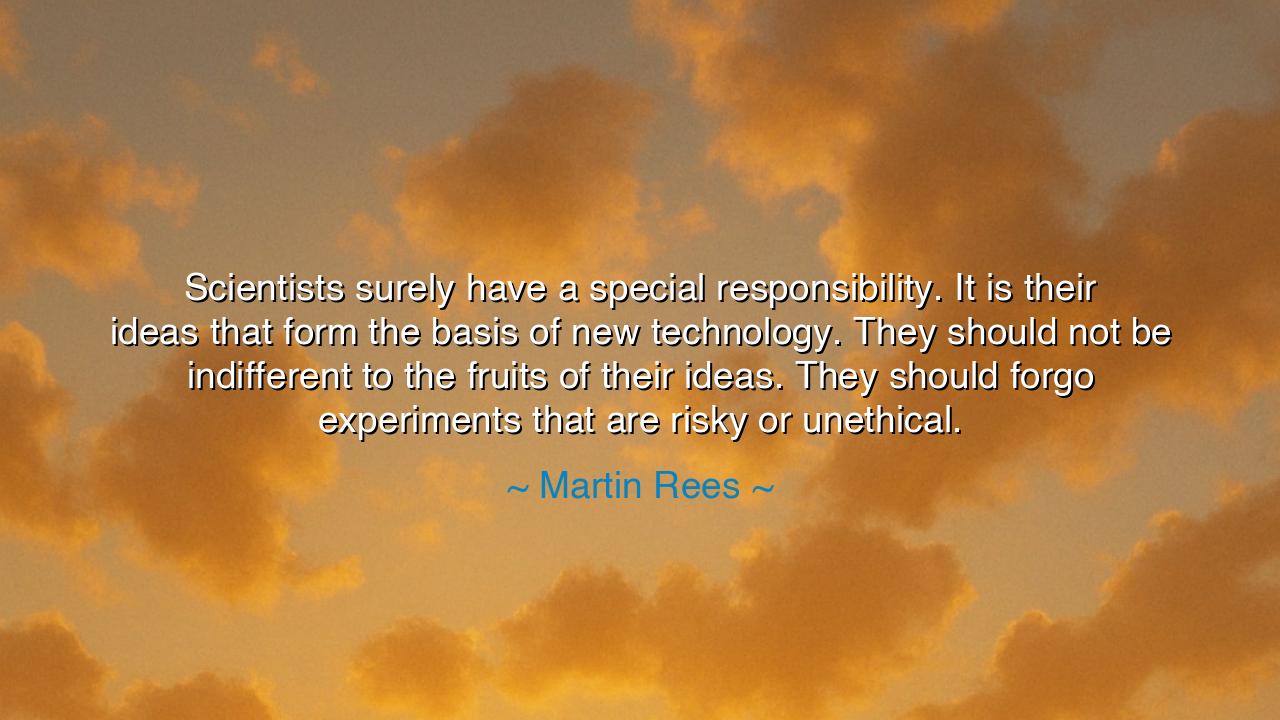
Scientists surely have a special responsibility. It is their
Scientists surely have a special responsibility. It is their ideas that form the basis of new technology. They should not be indifferent to the fruits of their ideas. They should forgo experiments that are risky or unethical.






Martin Rees, astronomer of the stars and philosopher of responsibility, once declared: “Scientists surely have a special responsibility. It is their ideas that form the basis of new technology. They should not be indifferent to the fruits of their ideas. They should forgo experiments that are risky or unethical.” His words burn with both clarity and urgency, for they speak to the sacred weight borne by those who hold the keys of discovery. To uncover truth is not enough; one must also consider what that truth will unleash upon the world.
The ancients, though living in a simpler age, knew this principle in their own way. The myth of Prometheus tells of the titan who stole fire from the gods and gave it to mankind. Though fire brought warmth and power, it also brought weapons and war. Thus, even in the earliest stories, humanity sensed that knowledge is a double-edged gift. Rees reminds us that the modern scientist stands in the same place: every idea can heal or harm, every invention can save or destroy. With such power comes the burden of vigilance.
History offers grave examples. When atomic weapons were born from the minds of physicists, they ended one war but created the shadow of annihilation for all future generations. Men like Oppenheimer saw their visions of energy twisted into instruments of death, and he himself quoted the ancient scripture: “Now I am become Death, the destroyer of worlds.” This is precisely the danger Rees warns against—that those who forge the tools of the future must not turn away from their consequences, but face them with courage and conscience.
Another tale comes from medicine. The discovery of anesthesia and antibiotics brought life and relief to millions, yet darker chapters remind us of unethical experiments performed on the vulnerable, where curiosity overpowered compassion. Knowledge gained at the expense of dignity is a poisoned fruit. Rees calls on all scientists to renounce such paths, to remember that the pursuit of discovery is not license to trample the sacred worth of human beings. Responsibility must guide ambition, else the quest for knowledge becomes tyranny.
Yet Rees does not speak only of restraint—he speaks of stewardship. To “forgo experiments that are risky or unethical” is not to halt progress, but to ensure it unfolds along noble paths. The world hungers for new technology, but it hungers more for wisdom, for inventions that elevate rather than enslave. The scientist, therefore, must become both discoverer and guardian, ensuring that what is created serves life, justice, and the common good.
The lesson for us all is clear: in every field of human effort, not only in science, we are responsible for the fruits of our actions. Words spoken, tools built, systems devised—none exist in a vacuum. They ripple outward, touching lives we may never see. Just as Rees calls on scientists to carry their responsibility, so too must each of us. Whether teacher, worker, parent, or leader, we must weigh not only what we can do, but what we should do.
So, dear listener, let Rees’s wisdom settle in your heart: knowledge without responsibility is danger, but knowledge with responsibility is salvation. Be wary of ambition unmoored from ethics. Demand of yourself not only brilliance, but conscience. For the future is not shaped by ideas alone, but by the character of those who wield them. And when you walk the path of creation, do so with care, humility, and reverence—for the fruits of your labor may one day decide the fate of generations.






AAdministratorAdministrator
Welcome, honored guests. Please leave a comment, we will respond soon